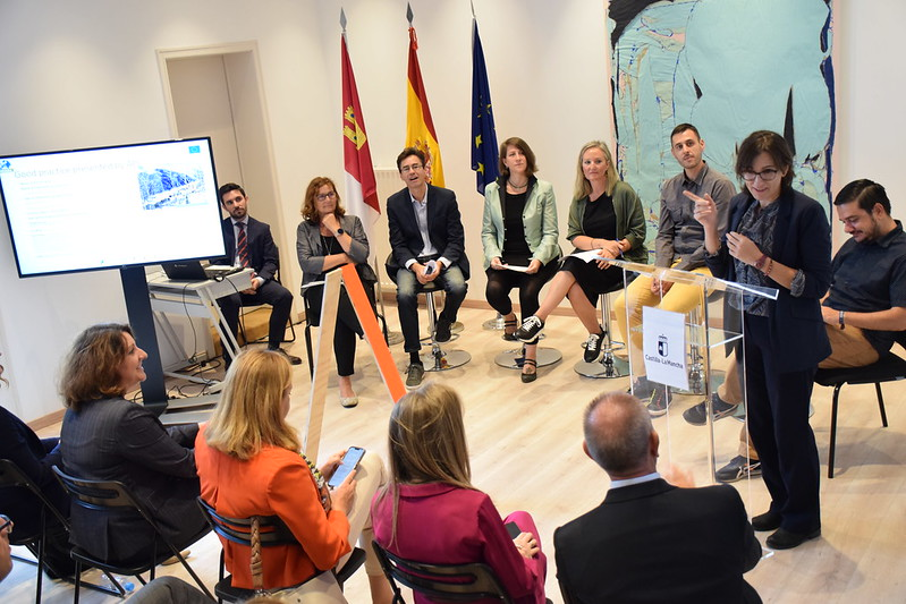REDERA+ Project “Revitalisation and Entrepreneurship for Disadvantaged European Rural Areas” comes to an end
The last meeting of the RedEra+ project, a European project led by the Regional Ministry of Economy, Business and Employment and the Regional Ministry of Education, Culture and Sports, took place in Brussels on 7 September 2022.
The REDERA+ project (2019-1-ES01-KA202-065864), funded by the ERASMUS+ Programme of the European Union, was created with the aim of helping to establish a stable population in rural areas through a vocational training offer adapted to local needs.
The event was held in Brussels at the premises of the Spanish Embassy in Belgium and was attended by leading representatives of the Regional Government of Castilla la Mancha and representatives of different European Regions who participated through the delegates of their offices in Brussels.
The meeting was welcomed by Mr. Jesús Ramón Asensio Echegoyen, Director of the Regional Office of Castilla-La Mancha in Brussels, who presented the working agenda and moderated the meeting as well as introduced the different speakers.
Ms. Rosa Ana Rodríguez Perez, Regional Minister of Education, Culture and Sports of the Government of Castilla-La Mancha, highlighted the role that training must play to promote rural development and the importance of vocational training to promote employment in the rural world. She also highlighted the budgetary effort that, in a region with a low population density such as Castilla-La Mancha, must be made to maintain a quality education system.
Ms. Patricia Franco Jiménez, Minister of Economy, Business and Employment of the Government of Castilla-La Mancha, stressed the importance of the leadership of Castilla-La Mancha in a project of European involvement in which entrepreneurship and vocational training are combined to fight against depopulation. He also highlighted the priority given to the demographic challenge in Castilla-La Mancha with the implementation of a law to curb depopulation and the necessity for the Regional Government to share experiences with European partners to continue building a strong Europe.
Ms. María Gafo Gómez-Zamalloa, Deputy Head of Unit in DG Agriculture and Rural Development of the European Commission, presented the main lines of work of her Unit and other areas of the European Commission to address the demographic and social challenges of rural areas in Europe. In his presentation, she said that the very composition of the current European Commission was a reflection of the importance given to demographic issues in rural areas, highlighting the cross-cutting nature of the subject and its link with the European cohesion policy.
The seven project partners then presented one of their good practices. The seven selected good practices were:
- NOTUS (ES): The school for shepherds in Catalonia.
- Agenzia Piemonte lavoro (IT): Ostana: the case of the regeneration of an alpine village
- Autonomous Province of Trento (IT): Adopt a Cow
- Tirantes (NL): The pig family
- ABU Akademie (DE): Aktive Naturschule – Freie Naturschule Templin
- Junta de Comunidades de Castilla-La Mancha (ES): ACCEM: a project of socio-labour insertion in Sigüenza
- Osnovna Šola Lovrenc na Pohorju (SI): the case of entrepreneurship of the Saint Lorenz bakery, artisan bread and natural beverages.
The partners then presented some of the conclusions and recommendations derived from the project. Among others, the following were highlighted:
- The presence/combination of micro and macro strategies for rural areas as a key element.
- The empowerment of the community and local actors through networking
- The role of vocational training and, more broadly, of the education system in rural areas as an element of revitalisation.
- The role of small entrepreneurial initiatives and their dissemination as examples in the local community itself.
In conclusion, Nuria Chust, Vice-Minister of Employment, Social Dialogue and Labour Welfare of Castilla-La Mancha, indicated that despite the difficulties posed by the pandemic, all the project objectives had been met. She stressed the cross-cutting nature of the demographic challenge, which in her opinion should find a relevant place on the agendas of regional and national governments and within the EU. She mentioned some of the elements of revitalisation that have proved to be fundamental, such as the presence of a specialisation strategy for the territory, the cooperation between civil society and the different administrations, the role and protagonism that women are playing in the revitalisation of rural areas and the role of VET.





Comments are closed.